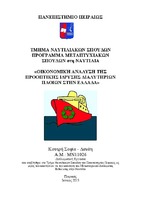Οικονομική ανάλυση της προοπτικής ίδρυσης διαλυτηρίων πλοίων ατην Ελλάδα

Προβολή/
Θεματική επικεφαλίδα
Πλοία -- ΔιάλυσηΛέξεις κλειδιά
Ανακύκλωση πλοίων ; Περιβάλλον ; Τιμές διάλυσης ; Διεθνείς κανονισμοί ; Κόστος συμμόρφωσης ; Μετακίνηση αγοράς ; Ship recycling ; Environment ; Scrap/demolition price ; International regulations ; Compliance cost ; RelocationΠερίληψη
Σκοπός της παρούσας διπλωματικής εργασίας είναι η μελέτη και οικονομική ανάλυση της προοπτικής κατασκευής/επέκτασης και λειτουργίας διαλυτηρίων πλοίων στην Ελλάδα.
Με το βλέμμα της Ευρωπαϊκής Επιτροπής Περιβάλλοντος στραμμένο στις διαδικασίες διαλύσεων πλοίων και στις περιβαλλοντικές και κοινωνικές επιπτώσεις που έχουν επιφέρει, ιδιαίτερα στις χώρες της Νοτιοανατολικής Ασίας όπου καταλήγει το μεγαλύτερο ποσοστό πλοίων Ευρωπαϊκών συμφερόντων και τον πρόσφατα ψηφισθέντα Ευρωπαϊκό Κανονισμό για την Ανακύκλωση Πλοίων, διαφαίνεται ενδεχόμενη μετακίνηση τμήματος της αγοράς στις Ευρωπαϊκές εγκαταστάσεις.
Υπό αυτές τις συνθήκες εξετάστηκε, μέσω επισκόπησης της σχετικής βιβλιογραφίας και αρθρογραφίας, το ενδεχόμενο η Ελλάδα να λάβει μερίδιο από τα προς διάλυση πλοία των οικολογικά υπεύθυνων πλοιοκτητών.
Πιο συγκεκριμένα, στο πρώτο κεφάλαιο δόθηκε η ιστορική αναδρομή της βιομηχανίας διαλύσεων μέσω της μετακίνησης του κέντρου δραστηριοτήτων των εγκαταστάσεων διάλυσης από τις βιομηχανοποιημένες στις αναπτυσσόμενες χώρες. Επιπλέον, υπό το πρίσμα των δυναμικά μεταβαλλόμενων οικονομικών κύκλων προσδιορίστηκαν οι παράγοντες που επηρεάζουν τις δυνάμεις προσφοράς και ζήτησης στην αγορά διαλύσεων, καθώς και οι βασικοί εμπλεκόμενοι φορείς της αγοράς.
Στη συνέχεια και στο κεφάλαιο δύο, δόθηκε περιγραφή των μεθόδων διάλυσης καθώς και της αγοράς διαλύσεων όπως έχει μέχρι σήμερα διαμορφωθεί, καλύπτοντας τις συνθήκες που επικρατούν τόσο στις παραδοσιακά κρατούσες Ασιατικές χώρες όσο και στα «πράσινα» διαλυτήρια της Ευρώπης και της Αμερικής.
Στο κεφάλαιο τρία, σκιαγραφήθηκαν οι επιπτώσεις της παραδοσιακά διενεργούμενης διάλυσης στο περιβάλλον και τον άνθρωπο, ήτοι το περιβαλλοντικό και κοινωνικό κόστος. Επιπρόσθετα, κατεγράφη η δράση της ΕΕ καθώς και των διεθνών οργανισμών προς την κατεύθυνση οικολογικά φιλικότερων μεθόδων και μέτρων προστασίας των συνθηκών εργασίας.
Στο κεφάλαιο τέσσερα, παρουσιάστηκε η δυνατότητα μετακίνησης από τις Ασιατικές χώρες του κέντρου δραστηριοτήτων της βιομηχανίας διαλύσεων καθώς και η μορφή της πρότυπης εγκατάστασης. Ακολούθως, έγινε αναφορά στις τρέχουσες συνθήκες της ελληνικής αγοράς διαλύσεων και μέσω του κόστους συμμόρφωσης με τα διεθνή πρότυπα και τη μέθοδο της Καθαρής Παρούσας Αξίας επένδυσης, εκτιμήθηκε η δυνατότητα επέκτασης των δραστηριοτήτων στην Ελλάδα.
Τέλος, στο κεφάλαιο πέντε κατεγράφησαν τα συμπεράσματα όπως προέκυψαν από την προηγηθείσα ανάλυση και δόθηκε απάντηση καθώς και περαιτέρω προτάσεις για το ερώτημα που αρχικά είχε τεθεί.


